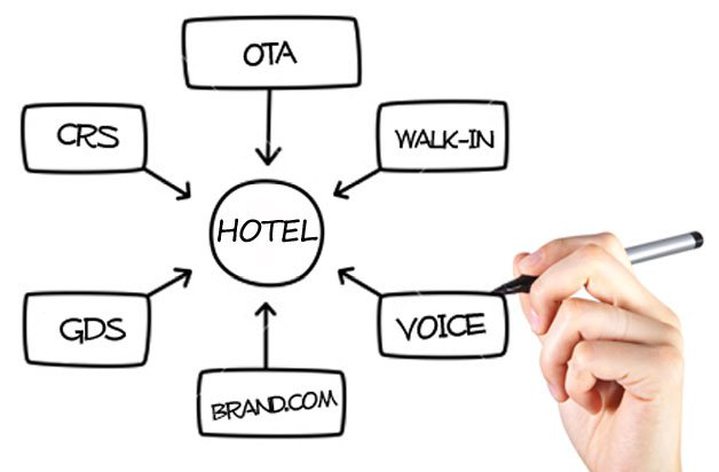The Evolution Of Hotel Room Distribution

It’s clear the future of leisure travel bookings is online.
Online channels, including online travel agencies and hotel websites, continue to experience dramatic growth in hotel bookings. Together, brand.com sites and OTAs account for nearly half of all leisure bookings, while the number of travelers who prefer calling the hotel directly, calling the brand’s 1-800 number, walking in or booking through a travel agent continues to wane, according to recent data from TravelClick.
InterContinental Hotels Group in its 2012 year-end annual report pointed to an increasing dependence on OTAs as a potential impact on the company’s brands and profitability.
“Travelers now have access to far more information through comparison websites, search engines and online travel agents,” the report reads. “Sales through these channels typically have high commission rates and are taking an increasing share of bookings across the travel and hospitality sector.”
While the old-fashioned channels cannot be forgotten (as they still represent about half of leisure bookings today, and are often the most profitable), revenue managers are shifting their focus to the channels that are growing the fastest. So just how are distribution experts evolving their strategies to keep up with the shift in booking demand?
“The increased move toward attribution modeling will allow hotels to better understand the value of each channel and of each guest and to price upgrades and amenities appropriately,” said Tim Peter, managing director of Tim Peter & Associates, an Internet marketing consulting firm. “Because the focus needs to be less about which channels drive the most volume and more toward which drive the greatest long-term value to ownership.”
While online channels may not be the most profitable, it’s important for hotels to be present there because it’s most often where travelers begin their search. Most travelers use a number of sources—and devices—when planning their travel, with almost half moving across devices during their trip-planning process, Peter said.
According to recent PhoCusWright research, travelers visit between 2.4-3.4 websites in each of the three booking stages: destination selection, shopping and purchasing. Therefore, hoteliers need to make sure their hotels are listed on many different channels, said Amy Severson, senior director of Industry Relations at Expedia.
OTAs such as Expedia often win the traveler over on price and brand experience. They usually offer supporting content to answer potential guest questions via reviews and supporting activity destination guides, Peter said. He said brand.com wins when it effectively answers guests’ questions, provides loyalty rewards and highlights key content.
To compete for travelers’ dollars, hotel suppliers, traditionally focused on taking care of the guest, have been forced to become digital marketing experts.
“It’s clearly a value proposition on an OTA site that can consolidate all the content from a city in one destination,” said Brian Garvan, director of sales for Choice Hotels International U.K. “However, what Choice has done is increased the depth of the hotel description past OTA standards. We’ve invested in video content for all of our hotels. We’ve done a lot to look at the ease of booking.
“Choice and a number of chains have done a lot of catch up.”
Paul Wood, VP of revenue generation at Greenwood Hospitality, said some travelers have certain perceptions of booking through either suppliers or OTAs. One of the strongest, he said, is the perception that “if I booked through Priceline I’m going to get the worst room in the hotel.”
Introducing metasearch
Metasearch sites, which conduct searches across multiple travel sites and allow the user to comparison shop rates and availability, are developing rapidly and threaten to shake up the brand.com and OTA dominance.
Wood said OTAs are adapting to metasearch faster than hotel suppliers, optimizing their content—specifically user-generated content—to appear more desirable in metasearch displays. Much of the advantage comes down to cost, where OTAs have traditionally had larger marketing budgets to spend on pay-per-click models. However, Hilton Worldwide, InterContinental Hotels Group and Marriott International, to an extent, have made great strides in the arena, he said.
“Metasearch is expensive,” Expedia’s Severson said, explaining that metasearch sites often charge on a cost-per-click or cost-per-action basis.
She said price is the number one driver of conversion on metasearch sites. “At the end of the day, hoteliers will get better performance through meta sites by providing the best, most competitive prices,” she said.
Peter agreed, saying that in theory metasearch offers hotels the ability to raise awareness among potential guests, but given that Google has already become the largest metasearch provider, “it’s likely metasearch is improving guests’ awareness of price more than property.”
“Metasearch serves to highlight both rate discrepancies across multiple channels for a single property and overall rate levels in a given market,” he said.
Rob Torres, managing director for travel at Google, pointed to TripAdvisor’s recent launch of a meta product and Priceline and Expedia’s acquisitions of Kayak and Trivago, respectively, as evidence that metasearch is becoming more important than ever.
“Travelers increasingly want to shop at one place that provides all options,” he said. “The one who wins will look beyond just pricing and focus on other value-added opportunities, such as better images, reviews and room type options.”
Rate parity
The decade-long practice of rate parity—agreements between suppliers and third-party distributors to sell similar room types at the same price, thus preventing undercutting—is increasingly coming under fire. Investigations into whether the practice of rate parity is anti-competitive are underway in the U.K. and the U.S.
The practice is not unique to the hotel industry, vertical distribution-channel agreements are practiced in retail, airline and other industries as well.
Hotel suppliers believe rate parity is beneficial because offering the same room to the same guest across multiple channels at different rates will only teach guests to keep looking for a better rate. “Given that most OTAs compete directly with brand.com for most guests, hotels have few incentives to offer OTAs preferential pricing,” Peter said.
Suppliers and OTAs can discount while remaining in parity by offering “fenced” deals, or discounts to closed user groups. The most common fences revolve around advance purchases or no-cancellation policies, bundling extra nights or amenities into the rate, or offering preference to specific customer types, such as loyalty program members.
Choice offers lower advanced-booking rates to loyalty members in the U.S., Garvan said.
Expedia has several means for targeting specific groups of travelers, Severson said. For example, Hotels.com Private Sales allow hoteliers to reach a fenced audience of millions of travelers across 70 countries. Private Sales are directed only to Hotels.com email subscribers and social media fans.
Another example is the mobile channel. “We know the vast majority of mobile bookings are done already in-market and close to the hotel, so by offering a mobile-exclusive deal, hotels are effectively fencing their offer to mobile users close by,” Severson said.
Should rate parity agreements be deemed anti-competitive, competition would undoubtedly arise among groups attempting to offer the “best” value, Peter said. However, whether “best value” gets defined as “lowest price” or some more meaningful portion of the guest experience remains to be seen, he said.
While some OTAs and other intermediaries will likely seek to offer the lowest prices, many will surely seek opportunities to insert themselves into the overall guest experience more effectively.
Michelle Grant, travel and tourism manager at Euromonitor International, said the U.K.’s Office of Fair Trading, in its ongoing investigation, is concerned that if rate parity agreements went away suppliers would simply stop giving OTAs inventory.
Wood remembers fondly the days before parity agreements. “Frankly, it was anarchy, it was chaos. But at the end of the day we educated the consumer to go to the OTAs,” he said. “We sit back and complain about it now but it was our fault.
“Today (rate parity) is absolutely mandatory,” he said.
Mobile as a traveler tool
While mobile users are seen as a closed user group and therefore can be offered a fenced rate, hoteliers are debating the strategy behind mobile discounting.
Because smartphones and tablets increasingly serve as both a research and booking channel, it’s important for hoteliers to research whether travelers would have booked at rack rate via mobile before offering discounts.
Guest experience is a foremost concern when developing a mobile strategy. Data from Google notes that a poor mobile experience acts as a deterrent to guests booking.
“It’s really neat the amount of bookings we’re seeing come through the smartphone,” Wood said.
Grant said she is “kind of surprised” by some of the mobile data emerging today. For example, Choice Hotels International recently announced that 13% of its online revenue comes from the mobile channel and Booking.com announced it had booked $3 billion through the mobile channel in 2012.
“Mobile room nights are growing rapidly at Expedia and at last check were growing at a pace of 130% month-over-month,” Severson said, adding that a recent Expedia survey showed 28% of smartphone owners have used their mobile device to book a hotel, and 34% indicated they haven’t yet but intend to.
“That said, it is also a crucial device for shopping,” she said. “Travelers get inspired, find destinations and hotel ideas by searching on their cell phones, so hoteliers will also want to be in the consideration set at this early stage."





